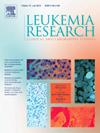Low serum complement C3 levels are associated with adverse clinical outcomes in myelodysplastic syndromes
IF 2.2
4区 医学
Q3 HEMATOLOGY
引用次数: 0
Abstract
Background
Complement C3, a critical component of the complement system, has been implicated in cancer risk across various malignancies. However, its role in myelodysplastic syndromes (MDS) remains inadequately explored. This study investigates the impact of serum complement C3 levels on survival outcomes in patients with MDS.
Methods
Clinical data, including demographic characteristics (sex and age), hematological indices (white blood cell count and platelet count), bone marrow blast percentage, immunoglobulin levels (IgG, IgM, and IgA), and complement components (C3, C4, and Factor B), were retrospectively analyzed in 145 patients with MDS. Serum C3 levels were compared quantitatively between healthy controls and patients with MDS. Univariate and multivariate Cox proportional hazards regression analyses were employed to identify prognostic factors associated with clinical outcomes in MDS.
Results
A significant reduction in peripheral blood complement C3 levels was observed in patients with MDS compared to healthy controls (P < 0.0001). Patients with lower serum C3 levels exhibited notably poorer clinical outcomes, including reduced overall survival (OS; P = 0.019) and leukemia-free survival (LFS; P = 0.043). Multivariate Cox regression analysis, incorporating the Revised International Prognostic Scoring System (IPSS-R) but not the Molecular IPSS (IPSS-M), identified serum C3 levels below 79 mg/dL as an independent prognostic factor for both OS (P = 0.041) and LFS (P = 0.005).
Conclusion
Decreased serum complement C3 levels emerge as an independent prognostic biomarker in MDS, correlating with unfavorable clinical outcomes regardless of IPSS-R stratification. This novel parameter offers additional prognostic value and may enhance existing risk assessment tools in the clinical management of MDS.
低血清补体C3水平与骨髓增生异常综合征的不良临床结果相关
补体C3是补体系统的一个重要组成部分,与各种恶性肿瘤的癌症风险有关。然而,其在骨髓增生异常综合征(MDS)中的作用仍未得到充分探讨。本研究探讨血清补体C3水平对MDS患者生存结局的影响。方法回顾性分析145例MDS患者的临床资料,包括人口统计学特征(性别、年龄)、血液学指标(白细胞计数、血小板计数)、骨髓原细胞百分比、免疫球蛋白水平(IgG、IgM、IgA)和补体成分(C3、C4、因子B)。定量比较健康对照组和MDS患者血清C3水平。采用单因素和多因素Cox比例风险回归分析来确定与MDS临床结果相关的预后因素。结果与健康对照组相比,MDS患者外周血补体C3水平显著降低(P <; 0.0001)。血清C3水平较低的患者表现出明显较差的临床结果,包括总生存期(OS; P = 0.019)和无白血病生存期(LFS; P = 0.043)降低。纳入修订国际预后评分系统(IPSS- r)而非分子IPSS (IPSS- m)的多变量Cox回归分析发现,血清C3水平低于79 mg/dL是OS (P = 0.041)和LFS (P = 0.005)的独立预后因素。结论血清补体C3水平降低是MDS的独立预后生物标志物,与IPSS-R分层无关,与不利的临床结果相关。这一新参数提供了额外的预后价值,并可能增强MDS临床管理中现有的风险评估工具。
本文章由计算机程序翻译,如有差异,请以英文原文为准。
求助全文
约1分钟内获得全文
求助全文
来源期刊

Leukemia research
医学-血液学
CiteScore
4.00
自引率
3.70%
发文量
259
审稿时长
1 months
期刊介绍:
Leukemia Research an international journal which brings comprehensive and current information to all health care professionals involved in basic and applied clinical research in hematological malignancies. The editors encourage the submission of articles relevant to hematological malignancies. The Journal scope includes reporting studies of cellular and molecular biology, genetics, immunology, epidemiology, clinical evaluation, and therapy of these diseases.
 求助内容:
求助内容: 应助结果提醒方式:
应助结果提醒方式:


